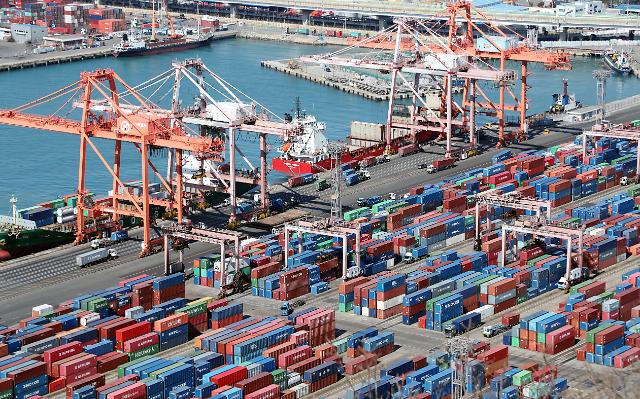
This picture shows the Sinseondae pier at Busan Port where container unloading work is underway on February 21. According to the Korea Customs Service, that the country saw its exports fall 2.3 percent in the first 20 days of this month from a year before with its trade deficit standing at $5.98 billion. [Yonhap]
SEOUL -- The South Korea economy is likely to slip into a vicious cycle of a snowballing trade deficit, a weakening Korean won against the U.S. dollar, and soaring inflation.
According to the Korea Customs Service, the country suffered a trade deficit of $18.63 billion (24.56 trillion won) so far this year until February 20. The sum was 2.7 times the $6.98 billion shortfall the country posted a year before.
In the first 20 days of February, the deficit was estimated at $5.98 billion, more than three times the $1.83 billion shortfall recorded a year earlier. The imbalance is expected to continue this year after the trade account began to turn into deficit in March 2022.
The shortfall was attributed to declining exports and rising imports amid the global economic slump. The country logged a 2.3 percent drop in exports in the first 20 days of this month from a year ago. The average daily sum of exports was 14.9 percent down from the same period of 2022.
Exports, the main growth engine of South Korea, have been on a downward march since last October. Last month, shipments of Korean goods plunged 16.6 percent from a year earlier.
The disappointing trade data are putting more downward pressure on the value of the local currency. On February 24, the Korean unit closed at 1,304.8 won per dollar, down 7.7 won from the previous close. It was the first time since December 19 that the local currency fell to the 1,300 won level against the greenback.
The won has fallen by around 6.5 percent so far this year. The losing value of the won reflected the dollar's regaining strength against other major currencies, including the Chinese yuan and the Japanese yen, amid concerns about higher U.S. interest rates for a longer period.
The government is struggling to work out measures to boost exports, reduce the trade deficit and shore up the value of the won.
An official with the Ministry of Economy and Finance made a verbal intervention in the Seoul currency market to stem the depreciation of the won February 17 by saying that the won's depreciation was too excessive. On February 22, the ministry convened an emergency meeting to discuss the volatile currency market situation.
However, the authorities have found it difficult to prop up the value of the won because market players are increasingly concerned about the U.S. Federal Reserve's hawkish position on additional rate hikes amid high inflation.
The weaking won is expected to raise import prices of natural resources such as oil and gas which will put more inflationary pressure on the economy.
Copyright ⓒ Aju Press All rights reserved.
